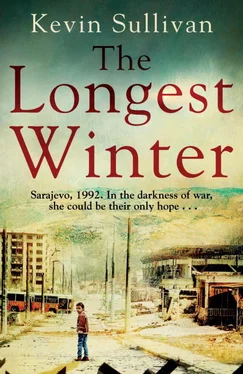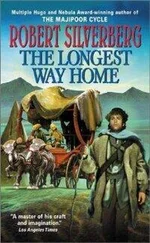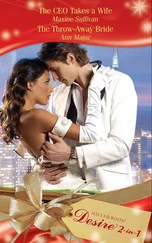Sanela gave him a surprised look, and translated.
‘Maybe we could meet tomorrow?’ Brad added.
Milena smiled and spoke rapidly to Sanela.
‘She says she’s taking a little girl to the children’s song festival tomorrow, but she will talk to you again the day after tomorrow. She’ll come to the theatre in the morning.’
* * *
‘We go this way,’ Zlatko said when they emerged into the courtyard. He and Sanela were tipsy.
Sanela kissed Brad. ‘Be careful among those foreigners,’ she said, and then she and Zlatko disappeared into the darkness.
Brad pulled on his gloves and extracted a torch from the pocket of his coat. Cold air settled on his neck. He drew his scarf more tightly against his skin and buttoned the top of his coat. Then he began walking.
Stars glittered brightly, making dull silhouettes of the tenements near the presidency. He had to switch on the torch to identify shell craters and debris. He kept it lit for only seconds at a time so as to avoid being seen. The corner of Tito Street and Đure Đakovića Avenue, leading to the General’s residence at the Delegates’ Club, was exposed to sniper fire. The day before, a woman had been shot there.
Brad was afraid a car would race along Tito Street and he’d be caught in the headlights just at the point when he moved out into the open. But no car came. He crossed the street and began walking up the avenue. The road had been lined with trees when he arrived two months before, but now many of them had been cut for firewood. The prospect was bleak, but further to the east was a tall terrace of art deco tenements, a delicate elegant facade where oil lamps flickered.
He thought of oil lamps in Sri Lanka: the faint light after sunset in villages that had not been hustled into the modern world with electricity. This sudden recollection shocked him. He felt an almost unbearable melancholy.
He walked faster across the ice, the last few steps to the gate of the General’s residence.
‘What’s your name?’ one of the Egyptian guards asked. They asked this every night, the same words, the same gruff expression and guttural intonation. The routine never changed, not once in the two months Brad had been coming here for the evening press briefing.
One of the soldiers retired to a wind-up field telephone and barked into it. Brad’s name was mangled in translation. The soldier stared at him, his face a mask.
After several minutes Brad was allowed in. He walked up the path towards the main house, a soldier beside him.
‘ Shukran ,’ he said to the soldier as they reached the front porch.
‘ Ma’af .’
His escort went back to the sentry post by the gate and Brad let himself into the building. As he passed through the front door he was met by an enveloping, infinitely comforting blast of warm air. He unfastened his coat and loosened his scarf before entering a long foyer at one end of which was a staircase.
He took off his coat and the flak jacket he wore beneath it and removed his notebook and pen from one jacket pocket and cigarettes and lighter from the other. He lit a cigarette and sat down by one of two coffee tables to wait.
Jim Danby, the UN spokesman, had a rolling gait, as though he had just dismounted from a horse. His pale freckled face was naturally jovial, the mouth turned up as though designed to smile. When frowning, Danby looked thoughtful rather than sullen. He liked fixing things, smoothing ruffled feathers, solving problems. He knew how to listen.
Danby also knew how to make optimal use of his Irishness. Small countries have a niche in international relations – they do not represent a threat. Since almost the beginning of his military career, Danby’s knack for diplomacy had kept him ahead.
However, as he emerged from the situation room on the first floor of the Delegates’ Club he was momentarily overcome by an uncharacteristic feeling of hopelessness. Conditions in the city were deteriorating by the hour, and the situation in some parts of the country was even worse.
There was no international policy, just the pretence of a policy, and that pretence was becoming uncongenial.
Moral tightropes are inevitable in matters of state. Danby could walk the highest tightrope over the deepest philosophical gorge. But he was also sensible to the distinction between pragmatism and cynicism.
He took consolation from the fact that he was at least able to stay above the international bickering. The British and French, who had troops on the ground protecting aid convoys, had become chronically quarrelsome. The General was French. Danby spoke French well, which the General appreciated, but Danby also understood how the British were inclined to think – a real mystery to the General – and the British liked to deal with him because of that.
‘Nobody else here?’ he asked, advancing towards Brad across the foyer. He looked around as though a handful of journalists might emerge from behind the furniture.
None did.
‘I’m the only enthusiast,’ Brad said.
Danby took a seat on the other side of the coffee table and felt his hopelessness deepen. If others came later, he would have to give out the same information all over again.
A waiter brought two small cups of espresso, and the journalist and the spokesman crouched on the edge of their chairs and fussily tore open packets of sugar and peeled adhesive tops from miniature cartons of milk.
Danby listed convoy deliveries and aid flights that had touched down at the city airport, and he outlined plans for the deployment of fresh UN troops near the runway.
‘The ceasefire is taking hold,’ he said, a little more brightly than he had intended. He preferred talking about big issues to reading out cargo manifests. Brad, though, seemed to lap up the convoy details, scribbling every last tonnage figure in his dog-eared notebook. ‘Not everywhere, but in many places around the country there’s been a marked reduction in fighting,’ Danby added, sounding, he guessed, like a bored teacher dictating a familiar lesson. ‘The point is, we now believe that placing UN troops along a broad swathe of territory to the west of the city is viable.’
The UN really did see the tiniest glimmer of light. It wasn’t spin. Plans were complete for a rapid deployment that could place blue helmets between the armies in a matter of days – but this depended on the will of the political leadership.
‘There’s a raging battle in Otes!’ Brad said, his intonation rising in mild perplexity. Two days of intense fighting in the west of the city made talk about interposing peacekeepers seem unreal.
Danby addressed the fighting in Otes. He was fluent with figures and facts, theories and possibilities. He volunteered information that placed the UN engagement in a positive light. He didn’t lie, Brad was pretty sure. He made optimum use of the most unpromising truths.
‘Michael Baring had a piece this morning about Otes,’ Danby said. ‘I suppose it’ll be flavour of the month now.’ Brad wondered if Danby knew about his own profound dislike for Baring. ‘But the fact is,’ Danby continued, ‘the heavy fighting is limited to one part of the city.’
‘The bombardments are bad all over,’ Brad said.
‘Our monitors have registered a downward trend. The attacks are less intense.’
At that moment there was a loud explosion, three hundred yards away, near the Koševo Hospital.
‘So, I’m not saying the problem’s solved!’ Danby chuckled.
Outside there was now a blizzard, white flakes falling in the darkness, shells falling among houses and factories and empty streets. The two men drank coffee, there in that oddly formal foyer where the air was permeated with cigar smoke, and the old fashioned furniture and heavy curtains reminded Brad of a theatre bar. They could hear cooks chattering in the kitchen.
Читать дальше












